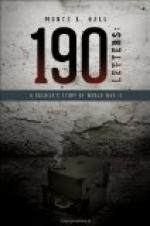At last, after five days of horror that lost us twelve hundred men, we were ordered back from the scene of abomination.
The regiment has been mentioned in despatches.
Dear mother, how shall I ever speak of the unspeakable things I have had to see? But how shall I ever tell of the certainties this tempest has made clear to me? Duty; effort.
February 23.
DEAREST BELOVED MOTHER,—A second day in billets. To-morrow we go to the front. Darling, I can’t write to-day. Let us draw ever nearer to the eternal, let us remain devoted to our duty. I know how your thoughts fly to meet mine, and I turn mine towards the happiness of wisdom. Let us take courage; let me be brave among these young dead men, and be you brave in readiness. God is over us.
February 26 (a splendid afternoon).
DEAR MOTHER,—Here we are again upon the battlefield. We have climbed the hill from which it would be better to praise the glory of God than to condemn the horrors of men. Innumerable dead at the setting-out of our march; but they grow fewer, leaving here and there some poor stray body, the colour of clay—a painful encounter. Our losses are what are called ‘serious’ in despatches.
At all events I can assure you that our men are admirable and their resignation is heroic. All deplore this infamous war, but nearly all feel that the fulfilment of a hideous duty is the one only thing that justifies the horrible necessity of living at such a time as this.
Dear mother, I cannot write more. The plain is settling to sleep under colours of violet and rose. How can things be so horrible?
February 28 (in a billet).
DEAR BELOVED MOTHER, AND DEAR BELOVED GRANDMOTHER,—I am writing to you, having just struggled out of a most appalling nightmare, and out of Dantesque scenes that I have lived through. Things that Gustave Dore had the courage to picture through the text of the Divina Commedia have come to pass, with all the variety and circumstance of fact. In the midst of labours that happily tend to deaden one’s feelings, I have been able to gather the better fruits of pain.
On the 24th, in the evening, we returned to our positions, from which the more hideous of the traces of battle had been partly removed. Only a few places were still scattered with fragments of men that were taking on the semblance of that clay to which they were returning. The weather was fine and cold, and the heights we had gained brought us into the very sky. The immensities appeared only as lights: the higher light, a brilliance of stars; the lower light, a glow of fires. The frightful bombardment with which the Germans overwhelm us is really a waste of fireworks.
I lay in a dug-out from which I could follow the moon, and watch for daybreak. Now and again a shell crumbled the soil about me, and deafened me; then silence came again upon the frozen earth. I have paid the price, I have paid dearly, but I have had moments of solitude that were full of God.




